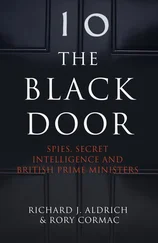In December 1939 Hugh Trevor-Roper, then twenty-five, was summoned from Merton College to work alongside Walter Gill, a lecturer in electricity who had achieved celebrity as college bursar by installing lighting in Merton’s quadrangles. During World War I ‘Gilly’ had served in an army wireless section in Egypt, where he ran an aerial up the Great Pyramid. He listed his recreations in Who’s Who as riding, wireless research and ‘rebuking sin’. Now he and Trevor-Roper formed the nucleus of the Radio Security Service, a branch of MI5 initially quartered in the cells at Wormwood Scrubs jail in west London. Day after day, Post Office operators, previously employed to catch unlicensed private wireless transmissions, scoured the airwaves for signals from enemy agents transmitting from Britain, whom it would then be the role of the Merton pair to scotch.
Gill and Trevor-Roper found themselves frustrated by the emptiness of the ether, or rather by the absence of such traffic as they sought. They were failing, so it seemed. Only slowly did they come to understand that this was not because their own eavesdroppers were incompetent, but because no German spies were signalling home. Finding their original function redundant, on their own initiative the two dons widened their researches: they began to gather intercepts from stations in Europe that used known Abwehr callsigns. One evening, in the flat they shared in the west London suburb of Ealing, over tea and biscuits they cracked an Abwehr hand-cipher – a lower encryption system used by Canaris’s bases for communications with out-stations and agents lacking Enigma machines. Trevor-Roper, a fluent German linguist, started to read its messages.
When this came to the notice of Alastair Denniston, chief of Bletchley Park, he was not amused. The RSS’s amateurs were told that they were meddling in matters of no proper concern to them. Denniston added crossly that the Abwehr material was unimportant anyway. In fairness, his dismay about the RSS’s freelancing reflected more than petty jealousy. Months, indeed years, lay ahead before Bletchley’s codebreaking operations achieved maturity, but from the outset it was obvious that if the Germans gained an inkling of what was being achieved, the game would be over. The more diffused was British cryptographic activity, the greater the risk of a leak. Broadway stepped in, to vent its own justified anger, when it was learned that Trevor-Roper’s report on Abwehr activities in North Africa was circulated to a distribution list that included the Post Office wireless section.
Gill and Trevor-Roper, stubborn and mischievous men both, persisted nonetheless; they were soon reading much of the Abwehr’s traffic with its out-stations. To the dons’ glee, even when Bletchley established its own cell to monitor the same Canaris links, it was RSS and not GC&CS which broke the next four hand-ciphers. In the spring of 1941 RSS acquired a new interception centre with American equipment at Hanslope Park in Buckinghamshire, and began to establish its own out-stations abroad. In the course of the war, the little service passed on a million signals to Bletchley.
MI6 eventually made a successful takeover bid for RSS, which was logical, given Broadway’s suzerainty over signals intelligence. Trevor-Roper found himself working with Stewart Menzies’ communications supremo, one of the secret service’s more exotic figures, Colonel Richard Gambier-Parry. The colonel was one of many luminaries of ‘secret shows’ who was able to exploit to his own advantage their freedom from accountability to a service hierarchy. Gambier-Parry established MI6’s communications centre at Whaddon Hall in Buckinghamshire, which he also made his personal residence. A keen horseman, he took over the pre-war owner’s pack of hounds and placed the huntsmen on Broadway’s payroll; on one notable occasion, the hounds in hot pursuit streamed through the security gate of Bletchley Park, arousing in the mind of a mounted spectator in the know about its activities an idyllic vision of the brutes gorging on half-digested decrypts. Gambier-Parry lived like a medieval baron. Trevor-Roper, who knew him as a fellow-foxhunter, marvelled: ‘In the world of neurotic policemen and timid placemen who rule the secret service, he moves like Falstaff, or some figure from Balzac, if not Rabelais.’ It should be added that for the rest of the war Gambier-Parry ran MI6’s communications with energy and flair.
Hugh Trevor-Roper became head of the intelligence section of MI6’s Radio Analysis Bureau, run by Felix Cowgill, a former Indian policeman. Cowgill intensely disliked his new junior, whom he deemed guilty of ‘irreverent thoughts and dangerous contacts’. The Oxford historian took it upon himself to go well beyond the production of raw intelligence, conducting evaluation and analysis in a fashion MI6 had always spurned, because it lacked officers clever enough to do such work. The RAB began to produce ‘purple primers’, local guides to Abwehr personalities and agents around the world, which soon ran to many pages. The bureau noted that the Italians, who before the war had enjoyed some notable intelligence successes, were now almost entirely dependent for material on the Germans, and thus acquired their weaknesses.
In the summer of 1941 Trevor-Roper acquired an assistant, twenty-one-year-old Charles Stuart, who had just left Christ Church with a First in history, and the two were joined by another Oxford man, Gilbert Ryle. Patrick Reilly, a gifted young diplomat who became Stewart Menzies’ personal assistant, thought their little cell ‘a team of a brilliance unparalleled anywhere in the Intelligence machine’. Trevor-Roper began to serve as secretary of the joint MI5–MI6 Wireless Committee, in which role he came to know almost everyone significant in the secret world. The peering, bespectacled historian became one of the outstanding British intelligence officers of the war. His mastery of German operations increased steadily, especially after Bletchley’s Dillwyn Knox broke into the principal Abwehr machine cipher in December 1941. While the chiefs of Broadway believed – more so following the Venlo fiasco – that their enemies’ intelligence officers were wizards of guile, from an early stage Trevor-Roper became convinced of the Germans’ institutional incompetence. As for the Abwehr’s chief, he said, far from being a masterspy Canaris was a lost little man drifting on the tides of fate.
Admiral Wilhelm Canaris came from a family of Rhineland industrialists. After service as a U-boat officer in World War I he became engaged in right-wing politics, while playing a role in rebuilding the German navy. A senior officer’s 1926 personal report extolled his skills at the military-political interface: ‘With the finest feel for foreign psychology and mentality, together with uncommon linguistic ability, he knows in exemplary fashion how to deal with foreigners (from the lowest to the prominent).’ Interestingly, however, other naval officers, including Erich Raeder and Karl Dönitz, disliked Canaris, thinking him sly.
During the early years of Hitler’s rule he ingratiated himself enthusiastically and successfully with the foremost Nazis. In 1935, aged forty-eight, he was appointed chief of Germany’s intelligence service, controlling both espionage abroad and counter-espionage at home, though Himmler ran his own domestic security service, the RSHA, under Ernst Kaltenbrunner, with the Gestapo as its enforcement arm. As Trevor-Roper noted, ‘All German politicians of consequence sought to set up their own information bureaus (just as they also sought to establish private armies) as additional supports for their personal authority; and it was essential to the purpose of these bureaus that their results should be the private property of their chiefs.’
Читать дальше












